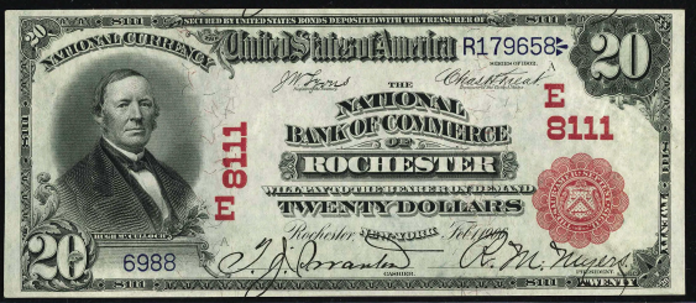Twenty Dollar Notes › Nationals › 1902 Twenty Dollar National Bank Notes › Kentucky Charters › 1902 $20 Hustonville Kentucky National Bank Of Hustonville
Get Value Now
| Item | Info |
|---|---|
| Series | 1902 |
| Charter | #2917 National Bank of Hustonville of Hustonville, Kentucky |
| Year Chartered | 1883, 252 Banks Chartered |
| City Info | Hustonville is a home rule-class city in Lincoln County, Kentucky, in the United States. The population was 405 at the 2010 census. It is part of the Danville Micropolitan Statistical Area. The community was originally known as The Crossroads from its location on trails connecting the Kentucky and Green rivers and the Falls of the Ohio with Logan's Fort. It was then known as Farmington and, after the 1818 erection of a post office, Hanging Fork after a local stream named for two bandits who were hanged by Virginia officers rather than escorted back for trial. For three months in 1826, it was known as New Store, but the name then returned to Hanging Fork. When the town was established on February 29, 1836, it was renamed Hustonville after two local landowners; the post office adopted the name the next year. The city was formally incorporated by the state assembly in 1850. Source: Wikipedia |
| Similar Cities | City name is unique, no others like it. |
| Seal Varieties | Red, Blue |
| See Also | If your note doesn't match try: 1. 1905 $20 Gold Certificate 2. 1906 $20 Gold Certificate |
| Other Info | 1. Value depends on notes known for charter, condition and market demand. |
| Neat Fact | Some issues contain regional geographic identifiers. N = New England. E = Eastern. M = Midwest. S = Southern. W = Western. P = Pacific. The letters were included for hand sorting purposes (Kelley, 5th Ed. P 5). |
No Obligations Offers and Appraisals
Please submit a good photo or scan. It will be identified and evaluated. Understand there may be subtle differences between the image you see above and your note. Signatures, design, markings and note condition will determine the offer price. Notes in Uncirculated or better condition receive the best offers.
Appraisals can be estimated for wholesale and retail prices. Wholesale is what dealers typically pay. Retail is what a collector might pay. Retail is slightly higher in most cases.
Please visit this page for USA Paper Money Reference. Do not treat this page as a reference guide, it is for appraisal and acquisition purposes only.
